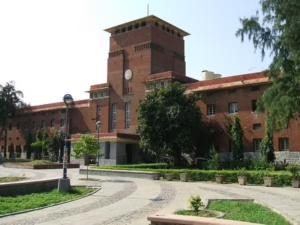The University of Delhi, most commonly known as DU, is one of the top university systems in India. DU has a constant academic calendar every year. This calendar informs students and teachers as to when classes are starting, when the exam days are, and when the holidays are given. It serves the very purpose of planning the year.
Here is an easy way to explain the academic calendar of Delhi University. It is intended as much for new as for existing students. This guide will keep you-really updated if you are a student of DU or are about to enroll in it.
Understanding the Academic Calendar
The academic year at DU is divided into two parts:
- Odd Semester: July to December
- Even Semester: January to May
The semester is very regular with classes, breaks, examinations, and holidays. There is also a time allocation for preparation before examinations. It also provides summer and winter vacations in a year.
Calendar for Undergraduate (UG) Courses
Odd Semester (July to December)
- Classes Start: Usually around the third week of July
- Mid-Semester Break: Around the first week of October
- Classes End: In the first or second week of December
- Exam Preparation: Around 3–5 days before exams
- Semester Exams: Start in mid-December
- Winter Break: Last week of December to the first week of January
Even Semester (January to May)
- Classes Resume: First week of January
- Mid-Semester Break: Happens in March
- Classes End: Around early May
- Even Semester Exams: Held in mid to late May
- Summer Break: Starts after exams, continues until mid-July
Calendar for Postgraduate (PG) Courses
The two-year postgraduate courses align with the undergraduate courses in terms of the semester pattern, supplemented possibly by some extra academic work in the form of:
- Seminars and Workshops
- Internships or Research
- Dissertation Submission
- Final Presentations or Viva
PG students have deadlines to manage fairly strictly, especially in relation to their thesis or research submissions, which are usually due at the end of April or early May.
DU Admission Schedule
DU admissions usually follow these steps:
- UG Admissions: Start in May or June, after CUET-UG results
- PG Admissions: Begin in July or August, after CUET-PG results
- Classes for New Students: Start shortly after the final admission lists are released
Now, for both UG and PG classes, CUET (Common University Entrance Test) is how all admissions are being conducted.
Internal Exams and Final Exams
Students are evaluated in two main ways:
- Internal Assessment
- Includes assignments, quizzes, and class participation
- Carries 25% weightage of the total marks
- Conducted during regular classes
- Final Semester Exams
- Held at the end of each semester
- Carries 75% weightage
- Separate exams for theory and practical subjects
Speaking, practical evaluations occur before the initiation of theory evaluations.

Public Holidays and Breaks
The University follows Indian national holidays and some university-specific observances:
- Republic Day – 26th January
- Holi – March (as per the Hindu calendar)
- Independence Day – 15th August
- Gandhi Jayanti – 2nd October
- Diwali Break – Usually in October or November
- Christmas Break – Last week of December
There are slight interruptions during the semester when students can take a chance to relax or catch up on their studies.
DU Events and Activities
DU is known for its vibrant college life. Many events are scheduled during the academic year. These include:
- Annual College Fests – Music, drama, fashion, and more
- Sports Meets – Inter-college and university-level
- Internship Fairs – Organized by college placement cells
- Placement Drives – For final-year students
- Seminars and Workshops – On current topics and career guidance
These events usually happen between January and March.
Tentative DU Academic Dates for 2024–25
| Event | Date Range |
| Odd Semester Starts | 22nd July 2024 |
| Mid-Semester Break (Odd) | 1st to 7th October 2024 |
| Classes End (Odd) | 6th December 2024 |
| Exams (Odd Semester) | 10th to 24th December 2024 |
| Winter Break | 25th Dec to 5th Jan 2025 |
| Even Semester Begins | 6th January 2025 |
| Mid-Semester Break (Even) | 15th to 21st March 2025 |
| Exams (Even Semester) | 12th to 28th May 2025 |
| Summer Break | June to mid-July 2025 |
Note: Dates may change based on official DU notifications.
DU School of Open Learning (SOL) and NCWEB
Students studying through SOL or NCWEB (Non-Collegiate Women’s Education Board) follow a slightly different schedule:
- Classes are held on weekends (Saturday and Sunday)
- Study materials are provided online
- Assignment Submission: Required mid-semester
- Exams: Usually held along with regular DU students
SOL and NCWEB give flexible learning options for working students or those unable to attend regular college.
Result Announcement
After exams, DU announces results within a few weeks:
- Odd Semester Results: Declared in January
- Even Semester Results: Declared in June or July
Students can also apply for:
- Revaluation: If they are not happy with their marks
- Supplementary Exams: If they fail in any subject
All details are posted on DU’s official website.
How to Check the DU Academic Calendar
You can have a full updated academic calendar, which is updated from the UODelhi official site from time to time.
Then click on ‘Academics’ > ‘Academic Calendar’. Select your course type (UG, PG, SOL, NCWEB) and download the latest schedule.
Conclusion
The academic calendar of Delhi University serves as a great aid for students and teachers. One can keep their life organized and plan their activities based on it. Knowing the time of commencement of classes, dates of breaks, and schedule of examinations only makes life a lot easier for students.
Whatever it is, a new student joining DU, or a student in its final year, preparing for placements, the academic calendar keeps track of movements. It also lays down the timelines for rest, events, and personal actions.
Make sure you keep checking the official calendar regularly. Stay well prepared and well-organized, and enjoy your time at one of India’s finest universities.
Also Read : APSchool In – A Guide for the Portal











